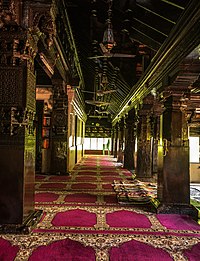Barelvi movement: Difference between revisions
m Revert edit(s) by 164.100.151.36 to last version by Escarbot |
|||
| Line 16: | Line 16: | ||
==Prominent Barelwi scholars of today== |
==Prominent Barelwi scholars of today== |
||
*[http://www.deenislam.co.uk/mix/haddad.htmlImam 'Abdallah Ibn 'Alawi al-Haddad ] |
|||
*[http://www.masud.co.uk Mohd Masud Ahmed ] |
|||
*[http://www.masud.co.uk Shaykh Nu Ha Mim Keller] |
|||
*[http://www.wimnet.org Allama Qamaruzzaman Khan Azmi] |
*[http://www.wimnet.org Allama Qamaruzzaman Khan Azmi] |
||
*[http://www.alahazrat.net Syed Shah Turab-ul-Haq] |
*[http://www.alahazrat.net Syed Shah Turab-ul-Haq] |
||
| Line 26: | Line 29: | ||
*[http://www.siratemustaqeem.net Dr Mufti Muhammad Ashraf Asif Jalali] |
*[http://www.siratemustaqeem.net Dr Mufti Muhammad Ashraf Asif Jalali] |
||
*[http://www.islamicfoundation.8m.com Muftie Abdul Wajid Quadri] |
*[http://www.islamicfoundation.8m.com Muftie Abdul Wajid Quadri] |
||
==Answers of Objections== |
|||
*[http://www.razaacademy.com/power.html The Prophet (sallal Laahu Alaihi Wasallam) Has The Power Of Giving Benefit And Loss] |
|||
*[http://www.razaacademy.com/alive.html The Holy Prophet Muhammad (Sallal Laahu Alaihi Wasallam) Is Alive] |
|||
*[http://www.razaacademy.com/intercession.html The Intercession Of The Holy Prophet (Sallal Laahu Alaihi Wasallam)] |
|||
*[http://www.razaacademy.com/unique.html The Holy Prophet Is A Unique Human Being] |
|||
*[http://www.razaacademy.com/knowledge.html Knowledge Of The Unseen Possessed By The Prophet (Sallal Laahu Alaihi Wasallam)] |
|||
*[http://www.razaacademy.com/noor.html The Holy Prophet (sallal Laahu Alaihi Wasallam) Is Noor] |
|||
*[http://www.razaacademy.com/hazir_o_nazir.html The Concept Of "haazir-o-naazir" Used For Rasoolullah (Sallal Laahu Alaihi Wasallam)] |
|||
*[http://www.razaacademy.com/tawassul.html Tawassul] |
|||
==Criticism== |
==Criticism== |
||
Revision as of 09:03, 19 February 2007
| Part of a series on |
| Islam |
|---|
 |
| Part of a series on |
| Islam in India |
|---|
 |
Barelwi (Hindi: बरैल्वि, Urdu: بریلوی) is a movement within Sunni Islam that was started by Ahmed Rida Khan of Bareilly, India (hence the term Barelwi).It is common practice for Muslims in South Asia (as elsewhere) to identify themselves by place-name, or by profession, association with a Sufi Tariqa (example, Qaadiri,Chishti, etc), or family lineage (such as Qureshi or Usmani), so as to distinguish between individuals with the same personal name.
The followers of Sufi tariqah indicate their attachment to Imam Ahmad Raza Khan with words like Raza, Razvi (or Razavi), Barakati, or Nuri; all of which refer to subdivisions of the Qadiri Sufi lineage. In fact, Barelwi Sunnis have adopted most major Sufi traditions as authentic tariqas or orders. Most of the people who follow Sufi Tariqas are known as Barelwis by the others.[citation needed]This could be an increasingly popular perception but it is not factual as there are many Sufi Shaikhs currently associated to the Deoband School of Thought. Barelwis in India are mainly Hanafi by Madhab (School of jurisprudence), but accept the other three Sunni schools to be valid.
Practices
In most of the Masjids of India the Salam written by Imam Ahmed Raza Khan is recited after Fajr Namaz and after Juma Namaz, seen as a differentiating feature from other Muslim movements.
They are noted to celebrate Eid-e-Milad, "the birthday of holy prophet (S.A.W)", Muharram, both Eids and Urs at the Dargah of their wali (saint). There are several hundred Dargahs in India at which Urs are performed. Some of the most famous Dargahs in India are in Ajmer, Delhi, Kaliyar, Barabanki, Bahraich, Gulbarga, Bareilly, Marehra, Kakori and Badaun.
Dargahs
Prominent Barelwi scholars of today
- 'Abdallah Ibn 'Alawi al-Haddad
- Mohd Masud Ahmed
- Shaykh Nu Ha Mim Keller
- Allama Qamaruzzaman Khan Azmi
- Syed Shah Turab-ul-Haq
- Ilyas Attar Qadri
- Tahir-ul-Qadri
- Mufti Muhammad Akmal (ARY Digital)
- Kokab Noorani.
- Mufti Allama Saeed Ahmad Asad
- Peer Syed Muhammed Irfan Shah Sahib Mashadi Moosvi
- Dr Mufti Muhammad Ashraf Asif Jalali
- Muftie Abdul Wajid Quadri
Answers of Objections
Criticism
Adherents of the Barelwi and Deobandi schools of thought disagree on many religious matters and have had many disputes. Salafi and Deobandi scholars have claimed that certain Barelwi teachings are incorrect and not in keeping with the teachings of the Prophet Muhammad (see Sunnah) accusing them of committing Bid'ah.In some instances they have even been accused of shirk, i.e., attributing partners to Allah, by exaggerating in their devotion and veneration towards the Prophet and buzurg/auliya.
Conversely, some Barelwi scholars declare Deobandis as non-Sunnis, and in some instances even non-Muslims, citing allegedly "contradictory" or even "blasphemous" writings from the Deobandi scholars. For example, in 2006, Mufti Abdul Mannan Karimi annulled the marriages of 200 Barelwi adherents for attending prayers led by a Deobandi cleric, claiming that they had become disbelievers by doing so.[1]

